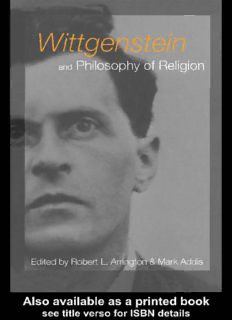
Wittgenstein and Philosophy of Religion Edited by Robert L.Arrington and Mark Addis PDF
Preview Wittgenstein and Philosophy of Religion Edited by Robert L.Arrington and Mark Addis
Wittgenstein and Philosophy of Religion Wittgenstein and Philosophy of Religion Edited by Robert L.Arrington and Mark Addis London and New York First published 2001 by Routledge 11 New Fetter Lane, London EC4P 4EE Simultaneously published in the USA and Canada by Routledge 29 West 35th Street, New York, NY 10001 Routledge is an imprint of the Taylor & Francis Group This edition published in the Taylor & Francis e-Library, 2003. © 2001 Edited by Robert L.Arrington and Mark Addis All rights reserved. No part of this book may be reprinted or reproduced or utilised in any form or by any electronic, mechanical, or other means, now known or hereafter invented, including photocopying and recording, or in any information storage or retrieval system, without permission in writing from the publishers. British Library Cataloguing in Publication Data A catalogue record for this book is available from the British Library Library of Congress Cataloging in Publication Data Wittgenstein and philosophy of religion/edited by Robert L. Arrington & Mark Addis p. cm. Includes index 1. Wittgenstein, Ludwig, 1889–1951—Religion. 2. Religion— Philosophy. I. Arrington, Robert L., 1938– II. Addis, Mark. B3376.W564 W546 2001 210´.92–dc21 00–055323 ISBN 0-203-46258-0 Master e-book ISBN ISBN 0-203-77082-X (Adobe eReader Format) ISBN 0-415-21780-6 (Print Edition) Contents Contributors vii Editors’ introduction ix Acknowledgements xiii Abbreviations xv 1 The gospel according to Wittgenstein JOHN HYMAN 1 2 Wittgenstein and magic BRIAN R.CLACK 12 3 Wittgenstein, religious belief, and On Certainty IAKOVOS VASILIOU 29 4 Creation, causality, and freedom of the will WILLIAM H.BRENNER 51 5 Faith: themes from Wittgenstein, Kierkegaard and Nietzsche MICHAEL P.HODGES 66 6 D.Z.Phillips’ fideism in Wittgenstein’s mirror MARK ADDIS 85 7 Wittgensteinian religion and ‘reformed’ epistemology PAUL HELM 101 8 Wittgenstein and the interpretation of religious discourse ALAN BAILEY 119 9 Wittgenstein and Wittgensteinians on religion KAI NIELSEN 137 10 ‘Theology as grammar’: Wittgenstein and some critics ROBERT L.ARRINGTON 167 Index 185 v Contributors Mark Addis is a Lecturer at the University of Central England and the author of Wittgenstein: Making Sense of Other Minds. Robert L.Arrington is Professor of Philosophy at Georgia State University. He is the author of Rationalism, Realism, and Relativism and Western Ethics, the editor of the Blackwell Companion to the Philosophers, and co-editor of two other collections of essays on Wittgenstein published by Routledge. Alan Bailey is College Lecturer in Philosophy at Pembroke College, University of Oxford. William H.Brenner is Professor of Philosophy at Old Dominion University and the author of Logic and Philosophy and Wittgenstein’s Philosophical Investigations. Brian R.Clack is Tutor in Philosophy at St Clare’s International College, Oxford. He is the author of An Introduction to Wittgenstein’s Philosophy of Religion and Wittgenstein, Frazer and Religion, as well as the co-author of The Philosophy of Religion; A Critical Introduction. Paul Helm is Professor of the History and Philosophy of Religion at King’s College, University of London and the author and editor of numerous works in the philosophy of religion, including his recent Faith and Understanding and Faith With Reason. Michael P.Hodges is Professor of Philosophy and Chair of the Department of Philosophy at Vanderbilt University and the author of Transcendence and Wittgenstein’s Tractatus. John Hyman is a Fellow of Queen’s College, Oxford, and the author of The Imitation of Nature. Kai Nielsen is Professor Emeritus of Philosophy at the University of Calgary and Adjunct Professor at Concordia University. He is the author of numerous books and articles in the philosophy of religion and other areas of philosophy, including the recent Naturalism Without Foundations. Iakovos Vasiliou is Assistant Professor of Philosophy at Georgia State University and the author of articles relating Wittgenstein to Greek philosophy. vii Editors’ introduction Wittgenstein’s remarks on religious belief have had an influence quite disproportionate to their number. He wrote very little on the subject, and much that we have from him on the topic comes from brief collections of remarks, notes others made of his lectures, and records of snippets of thought. In his later period, there are primarily the ‘Remarks on Frazer’s Golden Bough,’ the ‘Lectures on Religious Belief,’ and occasional remarks in Culture and Value. Nevertheless, most anthologies in the philosophy of religion and many collections of essays designed for introductory philosophy courses will have sections on the Wittgensteinian approach to religion (usually referred to as a form of fideism). His thought in this area has also had an impact in cognate areas such as religious studies and theology. In this volume our hope is to convey some of the excitement about Wittgenstein’s later thought on religion. We want to show how stimulating and suggestive Wittgenstein’s remarks can be—how they can lead to a totally new perspective on religious belief, to new ways of understanding specific topics such as creation and freedom of the will, and to a new focus for debating the issue of faith and reason. We also want to demonstrate how very controversial these remarks are. Wittgenstein scholars are not of a single mind regarding the significance of what Wittgenstein had to say on the subject, as will be readily apparent on reading several of the following essays. Moreover, some Wittgenstein scholars reject what appears to be the central philosophical message found in the few remarks on magic and religious belief—even while they accept what Wittgenstein has to say about language in other areas of discourse. And there are, of course, non- Wittgensteinians who forcefully repudiate the implications of his approach to religion. John Hyman gets us off to a good start with a brief introduction to Wittgenstein’s overall philosophy—both his early thought in the Tractatus Logico-Philosophicus and the later thought as found in Philosophical Investigations. After this survey and a brief treatment of the main themes in Wittgenstein’s philosophy of religion, Hyman raises some questions about ix
Description: